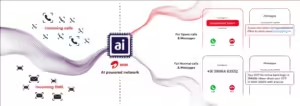
Airtel’s New AI Solution: A Game Changer in Spam Detection

Airtel Launches India’s First AI-Powered Spam Detection Network
In a groundbreaking move to combat the growing menace of spam calls and messages, Bharti Airtel has launched India’s first AI-powered spam detection solution. This pioneering network-based system will alert Airtel customers in real-time about suspected spam calls and SMS, shielding them from intrusive and unwanted communications.
How the AI-Powered Spam Detection Works
Airtel’s spam detection solution employs a dual-layer protection system:
- Network layer filter: Analyzes various parameters such as caller/sender usage patterns, call/SMS frequency, and call duration in real-time
- IT systems layer filter: Cross-references the analyzed data against known spam patterns to accurately flag suspected spam calls and messages
The AI-powered system can process an astounding 1.5 billion messages and 2.5 billion calls in just 2 milliseconds, equivalent to 1 trillion records in real-time. This has enabled the solution to successfully identify 100 million potential spam calls and 3 million spam SMSes originating every day.
Additional Spam-Fighting Features
Airtel’s spam detection solution also includes:
- Malicious link detection: Alerts customers to suspicious URLs received via SMS by scanning every message against a centralized database of blacklisted URLs
- Anomaly detection: Identifies indicators of fraudulent behavior, such as frequent IMEI changes
Compliance with TRAI Regulations
Interestingly, Airtel’s spam detection system aligns closely with the recent directives issued by the Telecom Regulatory Authority of India (TRAI). The regulator had mandated the implementation of AI/ML-based spam detection systems to combat evolving spam tactics.
Airtel’s Commitment to Customer Security
Gopal Vittal, Managing Director and Chief Executive Officer of Bharti Airtel, emphasized the company’s dedication to customer security, stating, “For us, keeping our customers secure is a burning priority.”With the launch of this groundbreaking AI-powered spam detection network, Airtel has set a new benchmark in the fight against spam calls and messages, ensuring its customers receive the highest level of protection against evolving threats.

How does Airtel’s AI-powered spam detection solution compare to other global solutions
Comparison of Airtel’s AI-Powered Spam Detection Solution with Global Alternatives
Bharti Airtel has recently launched India’s first AI-powered spam detection solution, which is designed to combat the rising issue of spam calls and messages. This innovative system employs advanced artificial intelligence to provide real-time alerts and utilizes a dual-layer protection mechanism. Here, we will compare Airtel’s solution with other prominent global spam detection systems.
Key Features of Airtel’s Solution
- Real-Time Alerts: Users receive immediate notifications about suspected spam calls and SMS messages.
- Dual-Layer Protection: The system processes communications through both network and IT systems layers, enhancing detection accuracy.
- High Processing Capacity: Capable of processing 1.5 billion messages and 2.5 billion calls daily, equating to analyzing 1 trillion records in real-time.
- Comprehensive Spam Identification: Successfully identifies around 100 million potential spam calls and 3 million spam SMS messages each day.
- Malicious Link Detection: Alerts users to suspicious URLs in SMS by cross-referencing against a centralized database of blacklisted links.
- Anomaly Detection: Identifies unusual patterns such as frequent IMEI changes, which may indicate fraudulent behavior.
Comparison with Global Solutions
| Feature/Service | Airtel’s AI-Powered Solution | Truecaller | Hiya | Nomorobo |
|---|---|---|---|---|
| Real-Time Alerts | Yes | Yes | Yes | Yes |
| Dual-Layer Protection | Yes | No | No | No |
| Processing Capacity | 1.5 billion messages, 2.5 billion calls daily | Not specified | Not specified | Not specified |
| Spam Identification Rate | 97% for calls, 99.5% for SMS | High (exact rate varies) | High (exact rate varies) | High (exact rate varies) |
| Malicious Link Detection | Yes | Limited | Limited | No |
| Anomaly Detection | Yes | No | Limited | No |
| Cost to Users | Free | Free with ads; premium version available | Free with ads; premium version available | Subscription-based |
Insights from the Comparison
- Processing Power: Airtel’s capacity to handle an enormous volume of calls and messages in real-time sets it apart from many existing solutions like Truecaller and Hiya, which do not disclose their processing capabilities.
- Dual-Layer Protection: The dual-layer approach of Airtel offers a more robust defense mechanism compared to single-layer systems used by most global competitors.
- Comprehensive Features: While other services focus primarily on call identification, Airtel’s inclusion of malicious link detection and anomaly detection provides an added layer of security that is not commonly found in other solutions.
- Cost Efficiency: Airtel’s solution is automatically activated for users at no cost, whereas competitors often rely on ad-supported models or subscription fees.

What specific parameters does Airtel’s AI algorithm use to identify spam calls and SMSes
Airtel’s AI-powered spam detection solution utilizes a comprehensive set of 250 parameters to identify and classify spam calls and SMS messages. The key parameters include:
- Caller/Sender Usage Patterns: Analyzes how frequently a number is used and its typical calling habits.
- Call/SMS Frequency: Monitors how often calls and messages are sent or received from a particular number.
- Call Duration: Evaluates the length of calls, with shorter calls often being indicative of spam.
- Velocity and Volume of Calls: Assesses the speed and quantity of calls made from a number within a specific timeframe.
- Frequency of Device Changes: Tracks how often the device associated with a number changes, which can signal suspicious activity.
- Number of Short-Duration Calls: Identifies patterns where multiple short calls are made, a common tactic used by spammers.
- Geographical Spread of Calls: Looks at the locations from which calls are made to detect unusual patterns.
- Time on the Network: Measures how long a number has been active on the network.
- Number of Names on the Same KYC: Checks if multiple numbers are registered under the same Know Your Customer (KYC) identity, which can indicate fraudulent behavior.
- Robo-Calling Devices: Identifies known devices used for automated calling, which are often associated with spam.
The system processes this data in real-time, cross-referencing it against established spam patterns to accurately flag suspected spam communications. This dual-layered approach—analyzing both network-level data and IT system metrics—enhances the solution’s effectiveness, allowing it to identify approximately 100 million potential spam calls and 3 million spam SMS messages daily.
What improvements are planned for Airtel’s AI spam detection system
Airtel’s AI-powered spam detection system has recently been launched, and while it has made significant strides in combating spam calls and messages, there are plans for further improvements to enhance its effectiveness and coverage. Here are some of the anticipated enhancements:
Planned Improvements for Airtel’s AI Spam Detection System
- Expanded Coverage:
- Feature Phones: There are plans to extend the spam detection capabilities to feature phones, which currently may not benefit from the advanced AI system.
- Video Calls: Airtel aims to include video calls in its spam detection framework, addressing a growing concern as scammers increasingly use video platforms for fraudulent activities.
- Enhanced Algorithm:
- Continuous updates and refinements to the proprietary algorithm will likely be implemented to improve accuracy in identifying spam. This could involve incorporating more sophisticated machine learning techniques and additional parameters based on evolving spam tactics.
- User Feedback Integration:
- Airtel may develop mechanisms to incorporate user feedback into the system, allowing customers to report missed spam or false positives. This feedback can help refine the algorithm and improve its detection capabilities over time.
- Broader Database of Spam Patterns:
- The company plans to expand its centralized database of known spam patterns and blacklisted URLs, which will enhance the system’s ability to recognize new threats as they emerge.
- Real-Time Learning Capabilities:
- Implementing real-time learning capabilities could allow the AI system to adapt quickly to new spam techniques, ensuring that it remains effective against rapidly changing spam strategies.
- Collaboration with Regulatory Bodies:
- Airtel may seek collaborations with regulatory bodies and other telecom operators to share data on spam trends, which could help in creating a more unified approach to tackling spam across networks.
- User Education Initiatives:
- Plans for user education campaigns could be introduced, helping customers understand how the system works and what steps they can take to protect themselves further.
These improvements aim not only to enhance the existing spam detection capabilities but also to ensure that Airtel remains at the forefront of combating telecommunication fraud in India, where spam has become a pervasive issue affecting millions of users daily.

Conclusion
Airtel’s launch of India’s first AI-powered spam detection system marks a significant advancement in the ongoing battle against spam calls and messages. By leveraging a sophisticated algorithm that analyzes over 250 parameters, Airtel is setting a new standard for customer protection in telecommunications. The real-time alerts, dual-layer protection, and comprehensive features such as malicious link detection and anomaly detection not only enhance user security but also align with regulatory mandates.Looking ahead, Airtel’s commitment to continuous improvement—through expanded coverage, enhanced algorithms, user feedback integration, and collaboration with regulatory bodies—demonstrates a proactive approach to tackling the evolving landscape of spam and fraud. As the telecom industry faces increasing challenges from spammers, Airtel’s innovative solution positions it as a leader in safeguarding customer interests.In conclusion, Airtel’s AI-powered spam detection system is not just a technological advancement; it represents a significant step toward ensuring a safer communication environment for millions of users in India. As the company implements planned enhancements, it will likely continue to strengthen its defenses against spam, ultimat
Discover more from
Subscribe to get the latest posts sent to your email.







